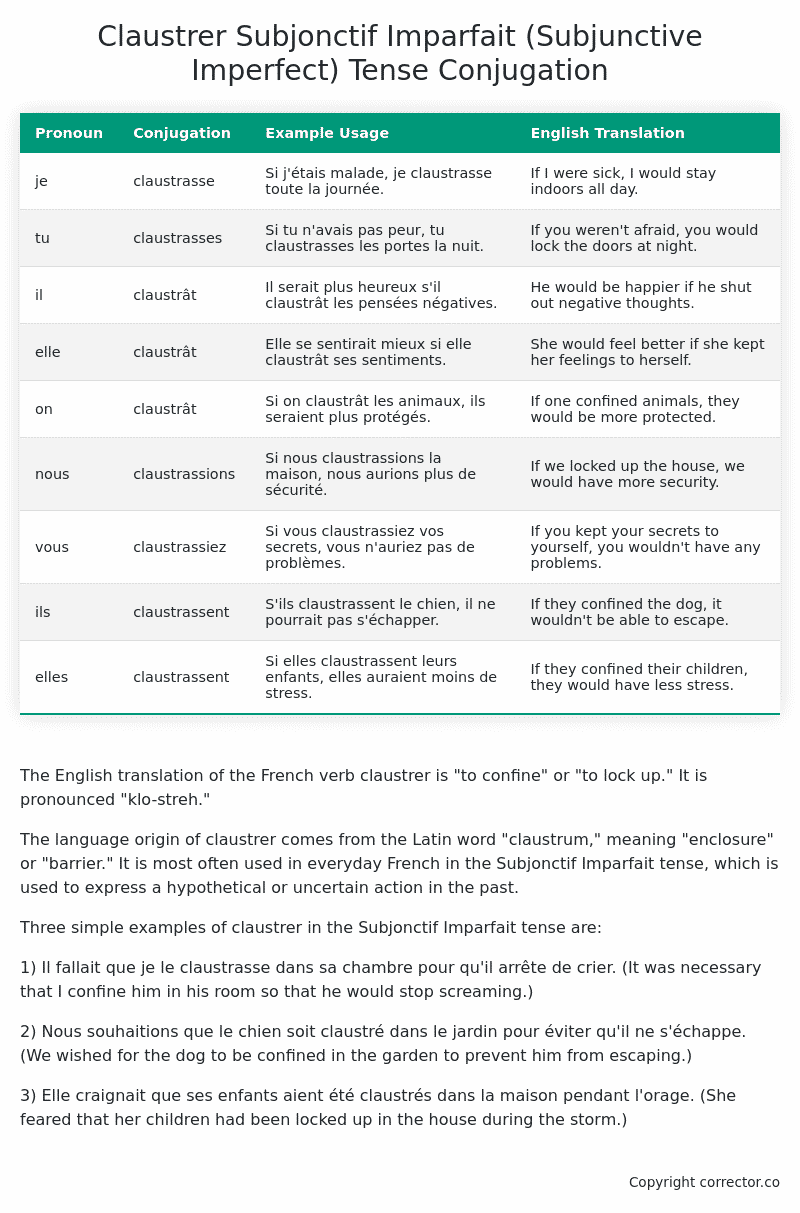Subjonctif Imparfait (Subjunctive Imperfect) Tense Conjugation of the French Verb claustrer
Introduction to the verb claustrer
The English translation of the French verb claustrer is “to confine” or “to lock up.” It is pronounced “klo-streh.”
The language origin of claustrer comes from the Latin word “claustrum,” meaning “enclosure” or “barrier.” It is most often used in everyday French in the Subjonctif Imparfait tense, which is used to express a hypothetical or uncertain action in the past.
Three simple examples of claustrer in the Subjonctif Imparfait tense are:
1) Il fallait que je le claustrasse dans sa chambre pour qu’il arrête de crier. (It was necessary that I confine him in his room so that he would stop screaming.)
2) Nous souhaitions que le chien soit claustré dans le jardin pour éviter qu’il ne s’échappe. (We wished for the dog to be confined in the garden to prevent him from escaping.)
3) Elle craignait que ses enfants aient été claustrés dans la maison pendant l’orage. (She feared that her children had been locked up in the house during the storm.)
Table of the Subjonctif Imparfait (Subjunctive Imperfect) Tense Conjugation of claustrer
| Pronoun | Conjugation | Example Usage | English Translation |
|---|---|---|---|
| je | claustrasse | Si j’étais malade, je claustrasse toute la journée. | If I were sick, I would stay indoors all day. |
| tu | claustrasses | Si tu n’avais pas peur, tu claustrasses les portes la nuit. | If you weren’t afraid, you would lock the doors at night. |
| il | claustrât | Il serait plus heureux s’il claustrât les pensées négatives. | He would be happier if he shut out negative thoughts. |
| elle | claustrât | Elle se sentirait mieux si elle claustrât ses sentiments. | She would feel better if she kept her feelings to herself. |
| on | claustrât | Si on claustrât les animaux, ils seraient plus protégés. | If one confined animals, they would be more protected. |
| nous | claustrassions | Si nous claustrassions la maison, nous aurions plus de sécurité. | If we locked up the house, we would have more security. |
| vous | claustrassiez | Si vous claustrassiez vos secrets, vous n’auriez pas de problèmes. | If you kept your secrets to yourself, you wouldn’t have any problems. |
| ils | claustrassent | S’ils claustrassent le chien, il ne pourrait pas s’échapper. | If they confined the dog, it wouldn’t be able to escape. |
| elles | claustrassent | Si elles claustrassent leurs enfants, elles auraient moins de stress. | If they confined their children, they would have less stress. |
Other Conjugations for Claustrer.
Le Present (Present Tense) Conjugation of the French Verb claustrer
Imparfait (Imperfect) Tense Conjugation of the French Verb claustrer
Passé Simple (Simple Past) Tense Conjugation of the French Verb claustrer
Passé Composé (Present Perfect) Tense Conjugation of the French Verb claustrer
Futur Simple (Simple Future) Tense Conjugation of the French Verb claustrer
Futur Proche (Near Future) Tense Conjugation of the French Verb claustrer
Plus-que-parfait (Pluperfect) Tense Conjugation of the French Verb claustrer
Passé Antérieur (Past Anterior) Tense Conjugation of the French Verb claustrer
Futur Antérieur (Future Anterior) Tense Conjugation of the French Verb claustrer
Subjonctif Présent (Subjunctive Present) Tense Conjugation of the French Verb claustrer
Subjonctif Passé (Subjunctive Past) Tense Conjugation of the French Verb claustrer
Subjonctif Imparfait (Subjunctive Imperfect) Tense Conjugation of the French Verb claustrer (this article)
Subjonctif Plus-que-parfait (Subjunctive Pluperfect) Tense Conjugation of the French Verb claustrer
Conditionnel Présent (Conditional Present) Tense Conjugation of the French Verb claustrer
Conditionnel Passé (Conditional Past) Tense Conjugation of the French Verb claustrer
L’impératif Présent (Imperative Present) Tense Conjugation of the French Verb claustrer
L’infinitif Présent (Infinitive Present) Tense Conjugation of the French Verb claustrer
Struggling with French verbs or the language in general? Why not use our free French Grammar Checker – no registration required!
Get a FREE Download Study Sheet of this Conjugation 🔥
Simply right click the image below, click “save image” and get your free reference for the claustrer Subjonctif Imparfait tense conjugation!

Claustrer – About the French Subjonctif Imparfait (Subjunctive Imperfect) Tense
Formation
Common Everyday Usage Patterns
Interactions with Other Tenses
Subjonctif Présent
Indicatif Passé Composé
Conditional
Conditional Perfect
Summary
I hope you enjoyed this article on the verb claustrer. Still in a learning mood? Check out another TOTALLY random French verb conjugation!


